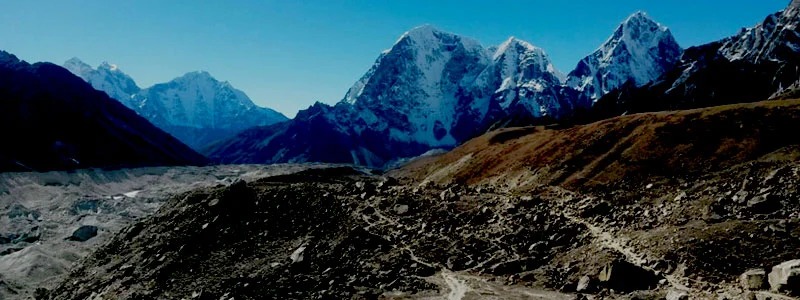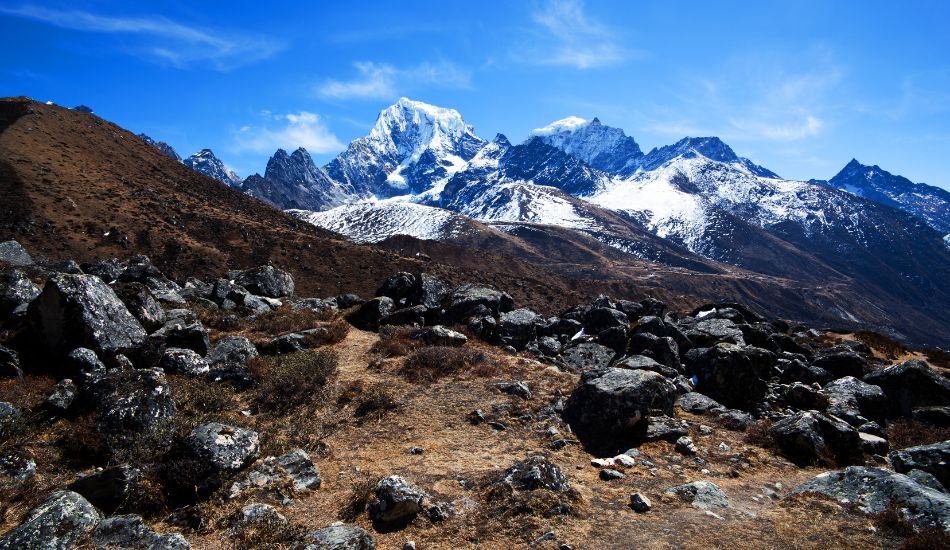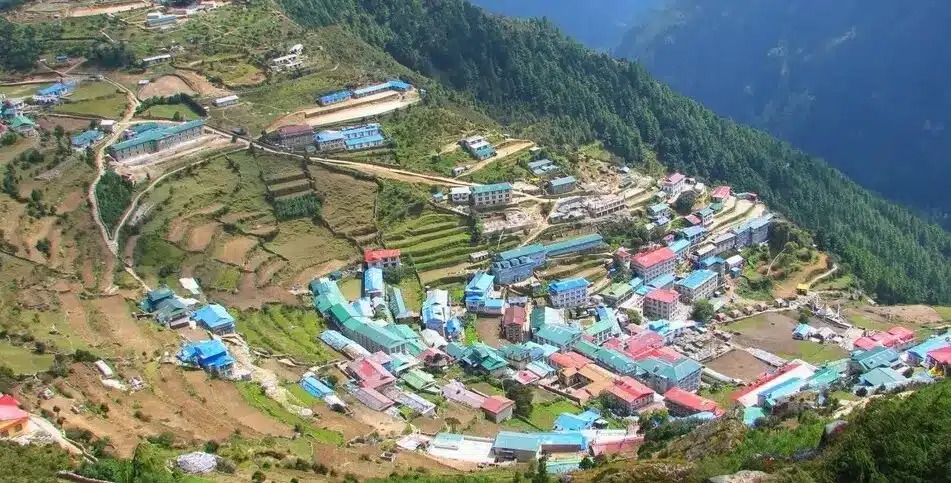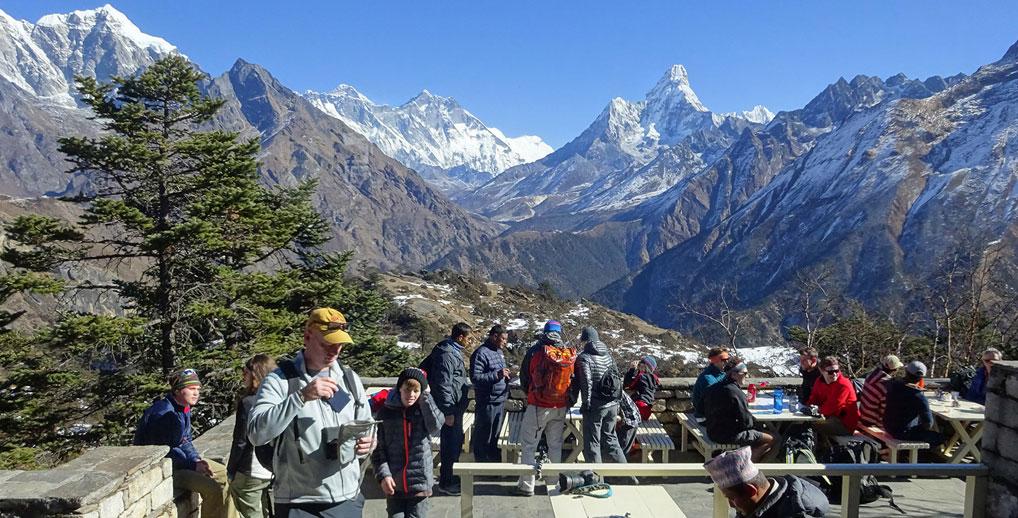Overview of Namche Bazaar
Namche Bazaar is a small town in the Solu-Khumbu region of Nepal at an elevation of 3,440m. It is the gateway to the Khumbu region and serves as the main trading center for the area, including the famous Mount Everest Base Camp. The town is 3,440 meters above Sea level and is surrounded by beautiful mountains, making it a popular destination for trekkers and climbers. Everyone has to cross to go to Gokyo Lake, Island Peak, and the Everest Three Passes trek.
Similarly, you can reach Namche Bazaar within two days from Kathmandu via Lukla Airport, but you will contact Lukla Airport within a day.
Highlights
- Elevation: 3,440 m
- Population: 1,647 (2001)
- Area code: 038
- District: Solukhumbu District
- Province: Province No. 1
- Rural Municipality: Khumbu Pasanglhamu

Namche Bazaar has a rich cultural heritage, with many traditional houses, monasteries, and temples. The town also has several lodges and shops catering to trekkers’ and climbers’ needs. Additionally, it has several bakeries, restaurants, and cafes that offer a variety of local and international cuisine.
One of the most notable features is the Saturday market, held weekly. A vibrant market is where local Sherpa people come to buy and sell goods, including food, clothing, and household items. It is an excellent opportunity for trekkers and climbers to experience the local culture and interact with the local people.
In addition to its cultural and commercial importance, the city is also an essential hub for medical services in the region. The town has several medical clinics and hospitals that provide medical care to trekkers and climbers. Furthermore, the city has helicopter landing facilities, making it an essential base for rescue operations in emergencies.
It is also an important center for environmental conservation, as it is surrounded by protected areas such as the Sagarmatha National Park, home to several species of flora and fauna, including the endangered Snow Leopard and the Himalayan Tahr (For detailed information, visit our blog Mount Everest Wildlife). The park is also home to several glaciers, including the Khumbu Glacier, which is the source of the rivers flowing through the region. One can explore the following:
- The Sherpa Museum
- The Sagarmatha National Park
- Local Sherpa culture and lifestyle
- The surrounding Himalayan Mountain ranges
- Mountain Museum
- Himalayan view from Khumjung village
- Khumjunging Village in Solu khumbu
- Everest view from Khumjung
- Internet is available in Namche
- The Sherpa Museum
The Sherpa Museum is a cultural and heritage museum in Solu-Khumbu, Nepal. It is dedicated to preserving the rich culture, history, and traditions of the Sherpa people. The museum features exhibits on the Sherpa lifestyle, religion, customs, and beliefs, along with photographs and artifacts from their daily lives.
Visitors can also learn about the Sherpas’ relationship with the high mountain environment, including their role as skilled mountaineers and their involvement in the mountaineering industry. The Sherpa Museum provides a unique opportunity to learn about the rich culture of the Sherpa people and their impact on the world.
The Sagarmatha National Park

The Sagarmatha National Park is a protected area in the Nepalese Himalayas, designated a UNESCO World Heritage Site in 1979. It covers an area of 1,148 km2 and includes Mount Everest, the highest peak in the world. The park is home to diverse flora and fauna, including the Himalayan tahr, snow leopard, and black bear. The park also provides habitat for several indigenous communities, who rely on the natural resources within the park for their livelihoods.
Local Sherpa Culture And Life Style
The Sherpa people are an ethnic group native to the Solu-Khumbu region of Nepal. Tibetan Buddhism heavily influenced their culture, and their traditional way of life revolved around agriculture and livestock herding. They are well-known for their mountaineering skills and role as guides and porters for expeditions to peaks such as Mount Everest.
Sherpa communities value community and family, with a strong emphasis on hospitality and helping one another. Festivals and religious celebrations are essential aspects of Sherpa culture, with traditional music, dance, and food playing central roles.
Mountain Museum
The Mountain Museum is located in the village of Namche Bazaar in the Solu-Khumbu region of Nepal. It is dedicated to showcasing the culture, history, and traditions of the Sherpa people. The Sherpa are native to the area and have a long history of mountaineering and working as guides on Mount Everest and other high peaks in the Himalayas.
The museum features exhibits on the history of mountaineering in the region, traditional Sherpa clothing and artifacts, and the flora and fauna of the high-altitude environment. Visitors can learn about the rich culture and history of the Sherpa people and gain a deeper understanding of the challenges and rewards of climbing in the Himalayas.
The Surrounding Himalayan Mountain Ranges.
The surrounding Himalayan mountain ranges, including Mount Everest, are part of the more extensive mountain range that runs through several countries, including Nepal, Tibet, Bhutan, and India. Mount Everest is the highest peak in the world, reaching a height of 29,032 ft (8,848 meters) above sea level. Namche Bazaar is a town in the Solu-Khumbu region of Nepal and is a popular starting point for trekkers and climbers heading to Everest Base Camp.
Khumjunging Village In Solu khumbu.
Khumjung is a village in the Solu-Khumbu region of Nepal, located at the foot of Mount Everest. It is known for being the birthplace of Tenzing Norgay, one of the first two individuals to reach the summit of Everest, and for its nearby monastery, which houses the sacred scalp of a yeti. The village is a popular trekking stop on the Everest Base Camp trail and the Everest Panorama.
Himalayan View From Khumjung Village
The view of the Himalayas from the Khumjung village in Nepal is likely to be breathtaking. The town is in the heart of the Solu-Khumbu region, home to some of the tallest peaks in the world, including Mount Everest.
You can see snow-capped mountains from the village, including Ama Dablam, Lhotse, and Thamserku, surrounded by lush forests and terraced fields. The view is stunning at sunrise and sunset, when the mountains are illuminated by the golden light of the rising sun.
Everest View From Khumjung
The view of Mount Everest from Khumjung is likely to be quite stunning. Namche Bazaar is a popular stop for trekkers on their way to Everest Base Camp, and Khumjung is a nearby village located at an altitude of 3,790 meters (12,434 feet). Mount Everest’s peak rises above the surrounding mountains from this vantage point. Remember that weather conditions can significantly affect visibility, so it’s best to plan your visit for a clear day for the best views. You may contact Boundless Adventure for the best trekking seasons.
Internet Available In Namche
Yes, the internet is available in Namche, a town in the Solu-Khumbu region of Nepal. However, the quality and speed of internet service may vary depending on the location and provider.
Discover Namche Bazaar – The Vibrant Heart of the Khumbu Region

Tucked away at 3,440 meters in the lap of the Himalayas, Namche Bazaar is more than just a resting point for trekkers heading to Everest Base Camp—it’s a thriving Himalayan town that pulses with culture, history, and life. Often referred to as the gateway to the Everest region, Namche is where traditional Sherpa heritage meets the bustling energy of modern mountain tourism.
As you wind up the scenic trail, Namche appears like a natural amphitheater carved into the hillside, surrounded by snow-capped giants. It’s the first major stop where trekkers can acclimatize, shop for essentials at the Himalaya bazaar, or soak in the panoramic views of Kongde Ri and Thamserku peaks.
Namche’s market scene is something you don’t forget. Every Saturday, people from surrounding mountain villages walk here, some walking for hours, to trade goods and connect with the community. It’s more than a market—it’s a weekly gathering reflecting the heart of Himalayan life. You’ll find stalls with everything from yak wool scarves and trekking gear to fresh vegetables and fragrant mountain herbs. For travelers, it’s a rare chance to experience how life flows in these high-altitude communities.
One place you should not miss is the Sherpa Museum. Tucked above the town, it gives a real sense of the Sherpa people’s way of life. The exhibits go beyond mountaineering—it’s a place where you can understand their deep-rooted spirituality, see historical photos of early Everest expeditions, and even learn about Tenzing Norgay, one of the first people to stand on the summit of Everest. It’s a quiet yet powerful reminder of the people who have called these mountains home for generations.
Whether you’re catching your breath after the climb or simply soaking in the mountain atmosphere, Namche Bazaar has everything you need. From warm, welcoming lodges to little bakeries serving fresh pastries and coffee, the town has a comforting rhythm inviting you to slow down. It’s where a simple meal feels earned and a quiet evening feels like a gift—an ideal spot to rest before the next leg of your journey deeper into the Everest region.
If you’re planning your Himalayan adventure, Namche should be more than a stopover—it should be a destination in itself.
10 Facts about Namche Bazaar for a Trekker in the Everest Region
Namche Bazaar isn’t just a quick stop on your way to Everest Base Camp — it’s a place with real character, energy, and some of the most unexpectedly great coffee you’ll ever drink at 3,440 meters. Here are 10 things you should know before you get there.
1. Altitude: 3,440 Meters Above Sea Level
Namche Bazaar sits at 3,440 meters (11,286 feet), making it one of the most crucial acclimatization stops for trekkers heading to Everest Base Camp. The elevation is high enough that your body needs time to adjust—most people spend at least two nights here to help prevent altitude sickness. That pause also gives you time to soak in everything Namche offers.
2. The Sherpa Capital of the Khumbu Region
Often called the “Sherpa capital,” Namche is the cultural and economic heart of the Khumbu region. It’s home to many Sherpas—an ethnic group famous for their mountaineering skills—and a place where their culture thrives. The town is also a great base to learn more about Sherpa life, past and present.
3. Your First Clear Views of Mount Everest
One of the best parts of reaching Namche is getting your first proper look at Mount Everest. The viewpoint above the town offers a panoramic sweep of Himalayan giants, including Everest, Lhotse, and the elegant Ama Dablam. It’s a moment most trekkers never forget.
4. Saturday Market Day: A Weekly Buzz of Activity
Every Saturday, Namche Bazaar transforms into a buzzing outdoor market. Locals from surrounding villages trek in to sell everything from vegetables to yak cheese to Tibetan trinkets. It’s also an excellent chance for trekkers to pick up gear or grab a souvenir—expect a bit of friendly haggling.
5. Home to the Sherpa Culture Museum
Interested in learning more about the Sherpa people than the tales of the summit of Everest? Spend an afternoon at the Sherpa Culture Museum. It’s a carefully curated facility with exhibits on ancient Sherpa homes, mountain climbing greats, and Buddhist traditions. There’s even a gallery dedicated to great climbers like Tenzing Norgay.
6. A Historic Trading Crossroads
Long before trekkers started passing through, Namche was a significant trade center between Tibet and Nepal. Yak caravans transported salt and dried meat from Tibet and rice and grains from the plains. Such a long tradition of trade gives the town a unique cultural blend.
7. Unexpectedly Great Coffee and Fresh Baked Goods
Think you’ll have to give up good coffee and pastries while trekking in the Himalayas? Think again. Namche has many cozy cafés and bakeries serving fresh bread, apple pies, chocolate croissants, and even authentic espresso. After days of simple meals, it’s a welcome treat.
8. Everest View Hotel: A Hike with a Bonus

Just a short hike from Namche lies the Everest View Hotel, one of the highest-altitude hotels in the world. It’s a great acclimatization walk that rewards you with sweeping vistas of Everest and other towering peaks. Grab a coffee or tea on the hotel’s terrace and take in one of the best views on the trek.
9. Yes, There’s Wi-Fi and Even ATMs
Despite its remote location, Namche is surprisingly connected. Many lodges and cafés offer Wi-Fi (though speeds vary), and there are even ATM, though they may not always work, and transaction fees can be steep. Still, it’s a good backup if you’re low on cash or need to message home.
10. An Essential Stop for Your Health
Namche isn’t just scenic—it’s strategic. Because of its altitude and facilities, it’s the ideal place to rest, acclimatize, and prep for the higher climbs ahead. Skipping acclimatization here increases your risk of altitude sickness further up, so take your time and let your body adjust.
5 Things You Must Do in Namche Bazaar

Beyond being a basecamp town, Namche has a list of experiences that are worth checking off. Here are five things you shouldn’t miss while you’re there.
1. Visit the Sherpa Culture Museum
A must for anyone curious about the people who make Himalayan life possible. The museum gives you an intimate look at Sherpa traditions, family life, and their incredible role in high-altitude mountaineering. It’s not just history—a living culture you’re walking into.
2. Hike to the Everest View Hotel
This half-day hike is perfect for acclimatization and gives you some of the best mountain views without pushing too hard. You’ll see Everest, Lhotse, Nuptse, and more—all while sipping tea at nearly 4,000 meters. Bring your camera, because the photos you take here will be some of your favorites.
3. Shop at the Weekly Bazaar
The Saturday bazaar has everything from handwoven wool hats to yak-bone trinkets or last-minute trekking equipment. It is a delightful way to interact with locals and experience how commerce still plays a significant part in this mountain economy.
4. Savor the Bakery Scene
After days of hiking and instant noodles, the smell of fresh bread in Namche is something else. The bakeries here are legit — think warm cinnamon rolls, banana cake, or a thick slice of apple pie, paired with a strong cappuccino. Grab a window seat, watch the village buzz below, and let yourself enjoy that little taste of comfort, miles away from everything.
5. Explore Local Monasteries
If you’ve got the time, take a quiet walk out to one of the local monasteries — Thame and Khumjung are worth the detour. These aren’t tourist spots; they’re places where life moves slower, monks chant softly, and the air smells faintly of incense. You don’t need to be religious — just respectful. Sit, breathe, and let the silence do its thing.
The Importance of Namche Bazaar
Namche Bazaar History and Culture
Namche has always been more than just a stop on the trail to Everest. Long before tourism, it was a bustling trade hub where Sherpas and Tibetan traders met at the Nangpa La pass to exchange salt, wool, and grains. You can still feel the echoes of that history in the stone-built homes, fluttering prayer flags, and local festivals that color the village life today. The Sherpa people’s traditions are deeply tied to the land, and places like the Sherpa Museum help keep those stories alive for locals and visitors.
Namche Bazaar: The Gateway to Everest
For most trekkers, Namche is the first authentic taste of the Everest region—and what a welcome it is. It’s not just a place to rest your legs; it’s where high-altitude adventure truly begins. Thanks to its strategic location, Namche has everything you need: teahouses, internet cafes, gear shops, pharmacies, and bakeries that serve surprisingly good coffee and cake at 3,400 meters! Yet, despite the modern conveniences, Namche hasn’t lost its soul. The rhythms of Sherpa life still hum beneath the surface, giving this mountain village a special kind of energy that you won’t find anywhere else.
Weather and Climate in Namche Bazaar
Seasonal Weather Patterns
- Spring (March to May): Clear skies, blooming rhododendrons, and moderate temperatures make this a prime trekking season.
- Summer/Monsoon (June to August): Expect heavy rainfall, slippery trails, and reduced visibility. This is the least popular trekking time.
- Autumn (September to November): Stable weather and crisp mountain views attract the most trekkers.
- Winter (December to February): Cold temperatures and snow may limit access, but the scenery is stunning and fewer crowds.
How Altitude Affects the Climate
Namche sits over 3,400 meters above sea level, and the weather follows different rules. The air is thinner, the sun feels stronger, and the temperature can drop sharply once the sun goes down. Even during the warmer trekking seasons, it’s not unusual to see all four seasons in one day: sunny mornings, cloudy afternoons, and chilly nights. The altitude also means the air is drier, so staying hydrated and dressing in layers is key. It’s all part of the high-mountain experience—unpredictable, raw, and unforgettable.
Also, read our blog, How Cold is Mount Everest?
Accommodation in Namche Bazaar
Types of Accommodation
Namche has something for every kind of traveler. If you’re on a tighter budget, there are plenty of cozy teahouses—simple but welcoming lodges run by local families where you’ll find warm meals and even warmer hospitality. For those looking for a little more comfort, mid-range lodges offer more modern rooms, private bathrooms, and sometimes even hot showers and Wi-Fi (though both can be spotty!). Whether you’re roughing it or treating yourself, a place in Namche will feel like home after a long day on the trail.
Teahouses in Namche Bazaar
Teahouses are the most common form of lodging. They are basic but cozy and often family-run. Expect shared bathrooms, simple meals, and a warm fire-lit dining room where trekkers gather.
Lodges in Namche Bazaar
Lodges are a step up from teahouses and offer better insulation, attached bathrooms, Wi-Fi (often paid), and sometimes hot showers. Some even have solar power and oxygen availability.
Facilities and Services
Namche’s popularity means you’ll find many conveniences: ATMs, gear rental shops, bakeries, cafés, pharmacies, and even a dental clinic. Remember that prices are higher due to transportation challenges—everything is carried in by a porter or a yak.
Summing Up
In conclusion, Namche Bazaar is a unique and vital town in Nepal. It is the gateway to the Khumbu region and the base for exploring the surrounding mountains. The village has a rich cultural heritage, a vibrant market, and essential medical and environmental conservation facilities, making it a must-visit destination for anyone traveling to the area.
Nepal Travel Visa
Everyone can get an arrival visa at the International Airport of Nepal. It would be best to have your pictures and US$25/—per person for a 15-day travel visa.
Contact Details
- Boundless Adventure Pvt. Ltd.
- Paknajol Marga, Thamel
- P.O. Box: 11670, Kathmandu, Nepal
- info@boundlessadventure.com
- boundlesstrek@gmail.com
- Phone:+977 1 4701884
- +977 1 4701885
- Mobile: +977 9851033819
- Viber/WhatsApp +977 9851033819
FAQs
Can You See Everest from Namche Bazaar?
You can see Mount Everest from Namche Bazaar—but not from the main town center itself. For the best view, take a short acclimatization hike to the Everest View Hotel or the Syangboche viewpoint, both located just above Namche. On a clear day, you’ll be treated to stunning panoramic views of Everest, Lhotse, Ama Dablam, and other iconic Himalayan peaks. This is often the first glimpse of Everest for most trekkers heading to base camp.
How to Get to Namche Bazaar?
Getting to Namche Bazaar typically involves two main steps:
- Flight to Lukla: First, fly from Kathmandu to Lukla (a 30–40 minute). Lukla is the gateway to the Everest region.
- Trek from Lukla to Namche: This two-day trek to Namche Bazaar involves overnight stops in Phakding or Monjo to acclimatize.
The trail follows the Dudh Koshi River, crosses several suspension bridges, and ascends through beautiful pine forests. The final stretch before Namche is steep but rewarding.
How to Go to Namche Bazaar from Kathmandu?
There are a few ways to reach Namche Bazaar from Kathmandu:
By Air and Foot (Most Common):
- Take a flight from Kathmandu to Lukla.
- Trek from Lukla to Namche (2 days).
By Road and Foot (Alternative Route):
- Drive from Kathmandu to Phaplu or Jiri (8–12 hours).
- Trek from there to Namche (takes 5–7 days depending on the route).
While the flight is the quickest and most popular option, trekking from Jiri or Phaplu offers a more immersive experience through lesser-known villages and landscapes.
What to Do in Namche Bazaar?
Namche is not just a stopover—there’s plenty to explore and enjoy:
Visit the Sherpa Culture Museum: Learn about Sherpa life, history, and Everest expeditions.
- Go to Everest View Hotel: Take an acclimatization hike for panoramic views of Everest and nearby peaks.
- Stroll Through the Weekly Market: Held every Saturday, this is the best place to see the local economy and culture in action.
- Enjoy the Cafés and Bakeries: Recharge with fresh coffee, pastries, or a warm Sherpa stew at one of Namche’s cozy eateries.
- Explore Nearby Villages: Short hikes to Khumjung or Thame offer more cultural insight and quieter trails.
- Visit Local Monasteries: Discover the region’s spiritual side with peaceful visits to Tibetan Buddhist monasteries.

